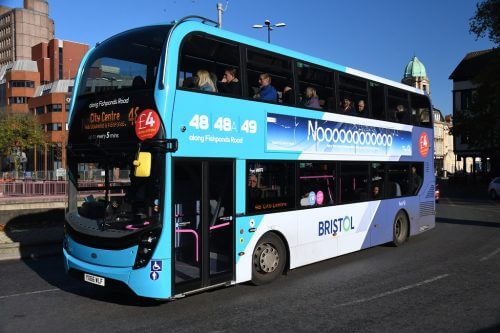 CBW’s latest Superfeature is on First West of England, a business doing its best to reinvent itself in fast changing times. Andy Izatt sets the scene
CBW’s latest Superfeature is on First West of England, a business doing its best to reinvent itself in fast changing times. Andy Izatt sets the scene
CBW’s Superfeature in this issue is on First West of England, selected because like First Kernow featured in CBW, September 7, 2017, it’s a business reinventing itself as it focuses on putting passengers centre stage. James Freeman was appointed Managing Director in October 2014 and as he outlines on p20, has a clear objective for the company. “I want it to be part of the community that we serve – a respected, valued part of the community,” he says.
With chronic congestion in the main population centre it serves, Bristol, and not much better in satellite cities and towns such as Bath and Weston-super-Mare, the challenges facing First West of England are not inconsiderable as James is the first to acknowledge. Service delivery hasn’t always been where it should be – a historic issue that for a variety of reasons has dogged the company for decades.
In last week’s issue (CBW, November 28, 2017), we set the stage by highlighting some of the steps that are being taken to turn that situation around. The message this week is that these are exciting times for a company that has had a significant number of new buses delivered, is reaping the rewards of embracing smartphone technology to reach its customers and is about to offer contactless after being reequipped with Ticketer ticket machines.
Significant developments to look forward to are the much anticipated opening of the first two stages of Bristol’s MetroBus BRT (Bus Rapid Transit) and the introduction of a fleet of gas-fuelled Scania Enviro400 City double-deckers that will contribute towards improving air quality in the east of Bristol. First West of England is in the spotlight.
More than 140 years of history
First West of England can trace its history back to the Bristol Tramways Company formed by George White in 1875. In 1887 it merged with the Bristol Cab Company to create the Bristol Tramways & Carriage Company.
Electric trams were introduced in 1895 and motor buses from 1906. Two years later it started building its own buses, selling them to other operators and what became Brislington-based Bristol Commercial Vehicles continued to manufacture chassis that were primarily bodied by Eastern Coach Works of Lowestoft until 1983 by which time it was part of Leyland.
Bristol Tramways’ operating territory was extended to Bath in 1909, Weston-super-Mare in 1910, Cheltenham in 1912 and Gloucester a year later – a process that continued after World War One with Swindon in 1921, Wells in 1922 and Coleford during 1924. Greyhound Motors of Bristol, which had started a coach service between its home city and London, was acquired in 1928.[…]
By subscribing you will benefit from:
- Operator & Supplier Profiles
- Face-to-Face Interviews
- Lastest News
- Test Drives and Reviews
- Legal Updates
- Route Focus
- Industry Insider Opinions
- Passenger Perspective
- Vehicle Launches
- and much more!


